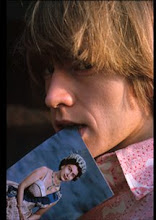







I would be remiss if I failed to acknowledge the forthcoming 09.09.09 extravaganza--something of great importance to British Invasion aficionados: The Beatles' 2009 remasters, both the stereo and mono mixes, will be officially released on CD. The mono mixes will only be sold in a boxed set format; the stereo counterparts will be available either individually or in a boxed set. (And then there's that Rock Band thing, too. We'll be getting the multitracks in that!)
Most exciting is the fact that the mono mixes of Revolver, Sgt. Pepper, and The Beatles (a.k.a. The White Album) will appear on official CD for the first time ever. Personally, I prefer the mono Pepper, so I'm glad it will be more accessible for those who haven't heard it before. Based on reviews I've read so far, the digital transfers have remained virtually untouched on the mono CDs, whereas the stereo mastering has been tinkered with slightly. I have heard a few of the stereo remasters, and I have been impressed with the results. I must admit - I was afraid we'd have an abomination on our hands, but thankfully, that is not the case. That said, for the stereo mixes, I'll return to my vinyl for my favorite "Beatles in Stereo" experience.
Here is a selection of Fab Four Fotos for your viewing pleasure. Long Live The Beatles!

























